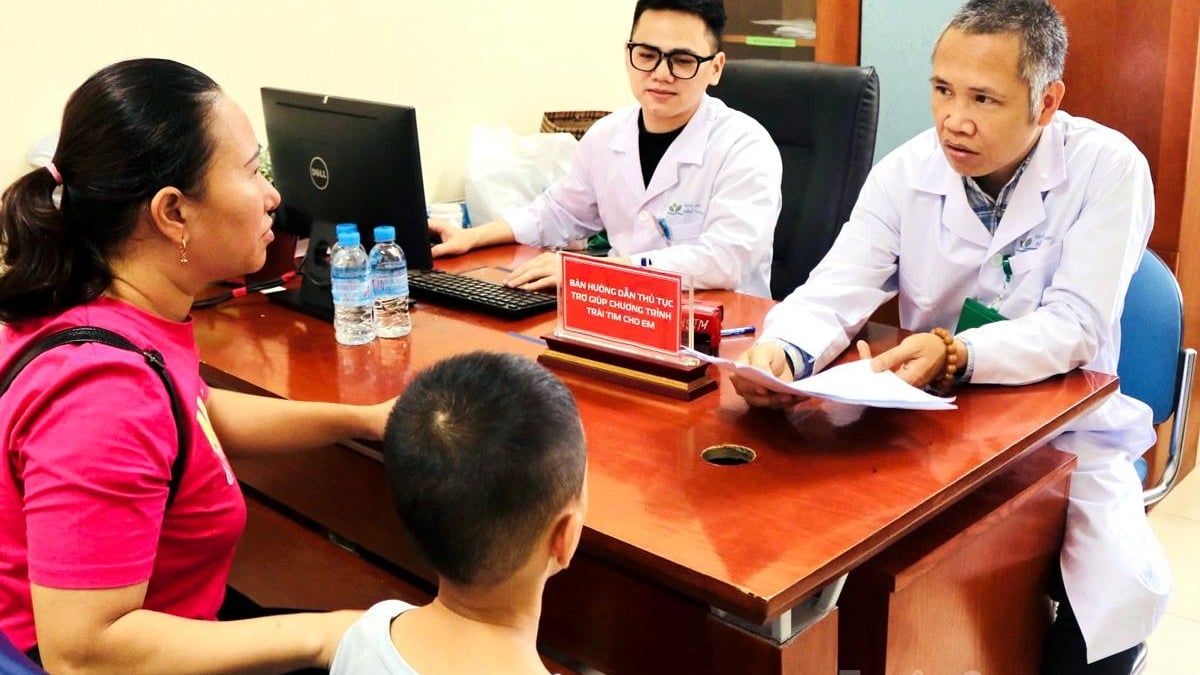In recent days, on social networks, images of a boy with many strange and uncontrolled actions such as waving his arms, shaking his body, stiffening his body... According to the sharing, this is a case of Tic syndrome. Children with Tic syndrome are increasing in number, mainly due to watching too much TV and phone.
Diseases from phones and televisions
Since the COVID-19 pandemic was brought under control, the number of children coming to Children's Hospital 1 (HCMC) for Tic Syndrome has increased compared to the previous period. On average, each month, the hospital receives 90-100 children for Tic Syndrome, compared to only about 50 cases before.
Dr. Ly Hien Khanh, Department of Infectious Diseases - Neurology, Children's Hospital 1 (HCMC), said that Tic syndrome is a type of spontaneous movement disorder. In addition to causes such as genetics and neurochemical disorders, the main cause today is that children are exposed to too much electronic devices to play games and watch movies.
"Many parents bring their children to the doctor with uncontrolled mouth twitching, limb twitching, neck shaking... Through surveys, most of the causes are due to excessive use of electronic devices. Some cases can recover after a short period of medication. However, there are also cases where the medication does not respond and relapses, forcing hospitalization. In these cases, in addition to medication, doctors also combine psychological therapy for the child. Most children's condition will improve after about 3-6 months," said Dr. Khanh.
According to Dr. Khanh, this syndrome usually occurs in children under 18 years old. About 20% of school-age children suffer from this disorder; it is often severe when children are 11-12 years old, then gradually decreases when they enter puberty. For some children, this disorder will disappear completely after growing up, but there are also children who face it until adulthood.
Doctor Nguyen Thanh Danh, Department of Otorhinolaryngology, Children's Hospital 2 (HCMC), said that in recent years, Vietnam has recorded an increasing number of Tic disorders in children, especially school-age boys.
According to doctors, Tic disorders are divided into many groups including: Motor Tics, Simple, Temporary Vocal Tics; Complex, Chronic Tics up to Tourette syndrome. The manifestations of specific Tic groups are as follows:
Simple motor tics include blinking, glancing, grimacing, shrugging, head and neck twitching, abdominal tightening, nose twitching, mouth movements, lip pouting, hand twitching... Simple vocal tics include throat clearing, coughing, nose blowing, spitting, screaming, barking, whistling, chirping, grunting...
Complex tics last longer and involve multiple muscle groups, movements (imitating other people's movements, stroking hair, kicking legs, jumping...) or sounds (saying words or sentences that are repetitive and out of context, screaming, swearing...).

Doctor Ly Hien Khanh, Department of Infectious Diseases - Neurology, Children's Hospital 1 (HCMC), examines a child patient.
Helping Children Overcome Tics
Psychologist Nhan Cam Nghi, Psychology Unit of City Children's Hospital (HCMC), said that children with mild to moderate Tic disorder usually do not affect their daily life. However, Tic disorder also affects the child's activities and self-image, easily leading to isolation, conflicts in relationships or even bullying. Therefore, families need to understand and accompany their children.
First, it is necessary to monitor the level and frequency of Tic occurrence. After observing and understanding the warning signs or symptom triggers, parents need to explain Tic disorder in a way that is appropriate to the child's age and cognitive level, guide the child to find a suitable movement to replace the Tic movement (for example, breathing rhythmically, counting from 1 to 10...), practice coping with triggers and practice relaxation.
According to psychologist Cam Nghi, the above steps are one of the applications of habit reversal behavioral therapy. In addition, parents need to note that Tic symptoms often increase when children are anxious, excited or tired. Therefore, organizing gentle activities that attract children's concentration and attention helps reduce the impact of Tic. In addition, encouraging and rewarding children when they try to control Tic also contributes to increasing their positive behavior.
"In daily life, families need to avoid criticizing children and reassure them when Tic symptoms affect their emotions and self-confidence. Spending time interacting and communicating with children and limiting phone interference also helps minimize the negative effects of Tic disorders in particular and on children's development in general," psychologist Cam Nghi analyzed.
Doctors recommend that when detecting signs of Tic syndrome in children, parents should take their children to see specialists for examination and testing as well as advice on appropriate treatment and intervention for each case.
Adults must set an example.
To help children give up the habit of watching TV and using phones, doctors advise parents to set an example and not use electronic devices in front of their children. Instead, spend time playing with your children, such as playing with puzzles, reading books, participating in physical activities or doing housework with them.
For children who are addicted to watching TV or using mobile phones, parents need to gradually reduce the amount of time they spend using them. Do not force your child to stop playing suddenly.
Source



































































































Comment (0)